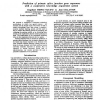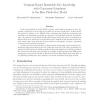45 search results - page 5 / 9 » Modeling Suppositions in Users' Arguments |
EKAW
2000
Springer
13 years 11 months ago
2000
Springer
Designing a terminological knowledge base consists in collecting terms and associating them to their definition. Our objective is to define a process model to support this design ...
SMA
2005
ACM
14 years 1 months ago
2005
ACM
In the parametric feature based design paradigm, most features possess arguments that are subsets of the boundary of the current model, subsets defined interactively by user sele...
ISMB
1993
1993
Prediction of Primate Splice Junction Gene Sequences with a Cooperative Knowledge Acquisition System
13 years 8 months ago
Wepropose a cooperative conceptual modelling environment in which two agents interact : the machineand the humanexpert. Theformer is able to extract knowledge from data using a sy...
AMKM
2003
Springer
14 years 21 days ago
2003
Springer
Every time a user engaged in work reads or writes, the user spontaneously generates new information needs: to understand the text he or she is reading or to supply more substance ...
CRYPTO
2004
Springer
14 years 26 days ago
2004
Springer
In the bare public-key model (BPK in short), each verifier is assumed to have deposited a public key in a file that is accessible by all users at all times. In this model, intro...


